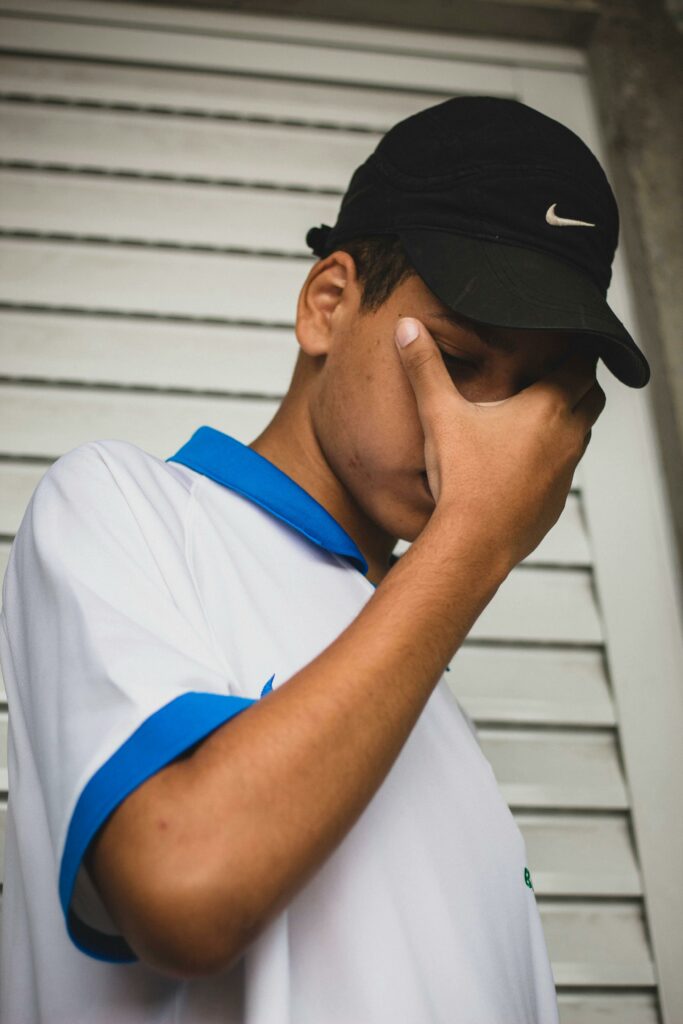The intense pressure to win can often cause performance anxiety to take control, dominating an athlete’s mental health and leaving them struggling to manage their emotions and physical responses. Before a crucial game or competition, the fear of not meeting expectations can become overwhelming, leading to panic attacks, tears, or physical symptoms that make it difficult to perform at their best.
Breaking the cycle by understanding what are the internal and external triggers of performance anxiety?
Performance anxiety can stem from both external and internal triggers. While it’s easy to think it’s just about performing well for others—whether to please a coach, parents, or teammates—the reality is more complex. Often, we put the responsibility on external pressures, but the internal struggle plays a significant role too. When athletes are dissatisfied with their own performance, they tend to become their harshest critics, fueling a vicious cycle of self-criticism. This self-imposed pressure only amplifies the anxiety, making it harder to escape from the overwhelming need to succeed. That’s why it is important to identify where the pressure comes from!
Recognizing the symptoms of performance anxiety
Performance anxiety from the pressure to win manifests both physically and mentally and recognizing these signs early is key for athletes:
Physical symptoms of performance anxiety:
- Heart palpitations
- Rapid breathing or hyperventilation
- Excessive sweating
- Trembling or shaking
- Muscle tension
- Nausea or stomach pain
Mental symptoms of performance anxiety:
- Intense fear of failure
- Negative self-talk and doubt
- Difficulty focusing
- Irrational thoughts about the consequences of losing
- Feelings of panic or loss of control
These symptoms can be exacerbated by social pressure, perfectionism and the constant fear of being judged (external & internal triggers)
What are the strategies to deal with performance anxiety from a young age?
Performance anxiety can start early in young athletes, often driven by expectations from parents, coaches, or even teammates. Teaching young athletes how to manage this pressure early on is crucial for preventing it from becoming a long-term issue.
Strategies for young athletes:
- Establish a mental preparation routine:
Help young athletes develop visualization techniques, mentally rehearsing the competition and picturing positive outcomes to reduce fear. - Develop deep breathing techniques:
Calm, controlled breathing helps reduce the physical symptoms of anxiety. Coherence breathing exercises can be particularly effective before a game. - Focus on effort, not just the outcome:
Shift the focus from winning to personal improvement. Encourage athletes to appreciate the skills they are developing, rather than solely concentrating on the result. - Emphasize the joy of the sport:
Remind athletes, especially young ones, to play for the fun and enjoyment of the game, not just for the competition. This helps reduce pressure and keeps them motivated.
What to do when anxiety and tears become chronic with the constant pressure to win?
When performance anxiety becomes persistent, it’s essential to address it before it spills over into other aspects of life. Managing chronic anxiety requires a thoughtful approach:
Rebuild confidence through small victories:
Sometimes stepping back from high-pressure competition and focusing on low-pressure training or smaller events can help athletes regain their confidence and improve their performance without added anxiety.xacerbated by social pressure, perfectionism, and the fear of being judged.
Work with a therapist:
A mental health professional who specializes in performance anxiety can help athletes understand the underlying causes and provide personalized strategies for coping.
Adopt relaxation techniques:
Practices like meditation, yoga, and mindfulness can help ease physical symptoms and reduce overall stress before competitions.
Break down goals into steps:
Instead of focusing solely on winning, encourage athletes to set small, achievable goals during practice or games. This reduces the overwhelming need for perfection. Check out our goals setting notebook for kids to achieve small, achievable goals
Inspiring examples of athletes who have dealt with mental issues
Top-level athletes have also faced anxiety attacks but found ways to overcome them:
- Michael Phelps, Olympic swimmer: Phelps has openly spoken about his battle with anxiety and depression. He worked with therapists and used visualization and breathing techniques to prepare for competition.
- Serena Williams, tennis player: Serena has shared her experience with anxiety before big matches. She meditates and practices mindful breathing to reduce stress and maintain focus.
- Simone Biles, Olympic gymnast: Biles made the courageous decision to withdraw from several events at the 2020 Olympics to protect her mental health, inspiring many athletes to prioritize their well-being.
I think one way to develop mental toughness is to simply practice on it. There are some game scenarios that I do play. When I’m serving, in particular, I’m always like OK, I’m going to pretend like I’m down 15-30, second serve. And I do that in practice.
Serena Williams
Conclusion: learn to listen to your body your mind and ask for help!
Performance anxiety is a common challenge for many athletes, but with the right tools and support, it can be managed. Whether it’s learning to handle the pressure from a young age, regulating kids’ expectations/emotions or finding specific strategies when the anxiety becomes chronic, the key is to prioritize both mental and physical well-being.
If you start noticing these symptoms, it’s crucial to take action and not ignore or suppress those feelings, as they can escalate and lead to severe issues like depression. This is especially important for children—let them enjoy the sport, play for fun and avoid adding unnecessary pressure. Encourage them by focusing on the joy they get from playing, rather than the outcome and remind them that their effort matters more than winning and also how much you love watching them when they are playing their favourite game!
References:
- Michael Phelps on managing his anxiety and mental health
- Serena Williams Gives A 3-Step Tutorial On Mental Toughness, Her ‘Greatest Strength’https://www.forbes.com/sites/carminegallo/2019/08/30/serena-williams-gives-a-3-step-tutorial-on-mental-toughness-her-greatest-strength/
- Simone Biles and the importance of mental health in sports

